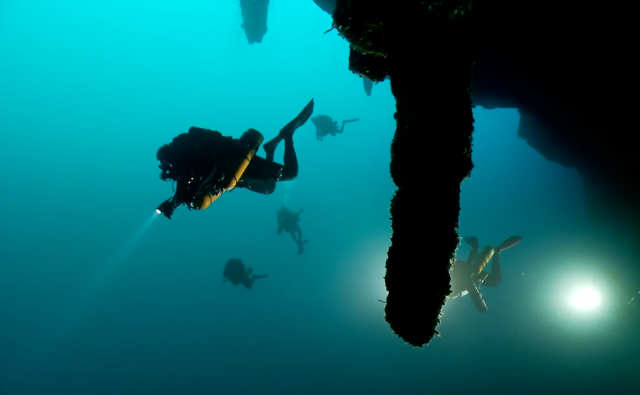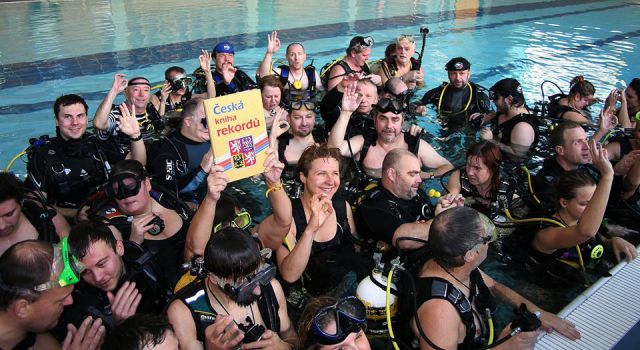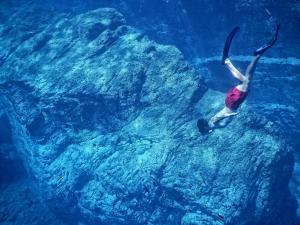How to Begin, Stop and Return to Diving
Recreationally - commertional diving
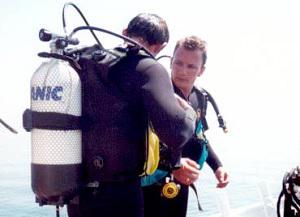
Even as a very young child I remember myself dreaming about visiting the water world under surface. I worked on it pretty hard – experiments with a long vacuum cleaner hose – not very successful, I must admit, experiments with breathing from a pet bottle (the biggest problem was to get it underwater), Depth freediving records. My first meeting with a real scuba diving happened as usual a bit later. On my holiday in Greece I followed a pretty common practice (at least among Czech tourists) and paid for two diving trips with an instructor. It should cover a briefing - supposedly to be held in English perhaps (bríf normaly, nou panic) and short drafts to about 10 metres of depth.
During the first draft I was able to understand how the equipment works. And as a “new-born expert” I managed to talk this young divemaster into the draft to deeper places. In 20 metres I faced the first problem. My BCD was tighten too much and started to press me badly. As I was a complete ignorant of underwater communication I gave a thumb down to the divemaster at 25, trying to say that I feel really bad. He surprisingly took the gesture in the common way as a signal for further descent.
At 30 I decided to untighten the BCD a bit to ease up and help myself to breathe in once again. This led the divemaster to panic because he thought I’m trying to take the BCD off completely. We had a short fight over the buckle followed by uncontrolled and impressively quick ascent at the surface. A dreamy first draft!
Could be also the last one but on my way home I just knew that this is not the right end and that I would try really hard to conquer diving world for myself. The first thing I did after my arrival to Prague, I found the closest diving school and entered a dreamed of Open Water Diver Course. I wasn’t seeking for any information concerning the quality of an instructor. But I was lucky again and came upon the right person. Diving is not just a business for him but also a lifelong passion and a hobby. Getting my first lesson I begun to understand that it won’t be that easy as it seemed at the briefing in Greece. The feeling of doing it the right and safe way fed me up completely. The first drafts to Czech quarries, the first night drafts (performed at noon) to Slapy and Orlík and first trips to localities abroad followed quickly.
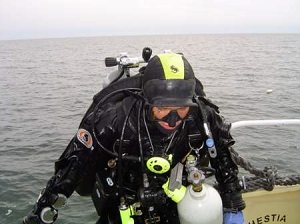
As I wanted to become a diving expert, no limits in depth, keen on wrack discoveries, cave diving etc. I took every other certificate I got as an inevitable step to my professional development – nitrox, deep-diver, rescue…. I was successful at work, my girlfriend get used to the life of diver-mate, so what else to spend money for than for your passion. Afterwards I become a divemaster, something like instructor’s assistant. I didn’t want to have other people’s safety on my shoulders under the surface, I must admit but it was inevitable part of my diving career in the commercial certification system I was part of. And the list of certificates I couldn’t live without continued. Wracks in depths untouchable without helium led to trimix diver course. Even if you were trained and certified to get you got to the wrack, you are not allowed to enter it. That means Cave diver course.
At the same time I’ve changed my job to have more time for my passion. That step attacked family finance substantially and it was not so easy to feed up the hungry beast of my diving career.
It was possible to observe a splitting up of the group of divers. There were some who continued in their diving development and others who hadn’t necessary qualification for more and more localities at once. Financial limits were one reason; unreasonable settling a family was the other one. A lot of people I have known as divers ended up all this show or became a recreational diver (unthinkable and disgracing state ever before) which go underwater twice a year on their holiday.
Those who hold on diving grew away quickly and by paces. Caves, Trimix wrecks, scooters, rebreethers. I was drifted from diving world to the dry land by envy and knowing that my finances doesn’t allow me to keep that pace. Local quarries get worn out for you at once. Wrecks are inaccessible for you to get in because you don’t have necessary qualification. But your friends do. Getting to one and staying outside warns out pretty early too. Sooner or later, without my wanting it, my diving equipment covered with dust in our garage and I became once-was-a-great-diver.
But I knew somewhere deep in my heart that I miss water very much. SO I didn’t follow the common way, didn’t sell my diving things but stored it for better times. And those better times seem to came this spring.
Bottles covered by dust became too depressive a view for me. Having a new job, new girlfriend and new plans and dreams to follow comes hand in hand. I’m well experienced and hopefully a bit wiser. I would like to share with you a couple of advices. Perhaps you won’t end up copying me. I wish you to keep the pleasure of diving better than I did.
Majority of my diving equipment is currently under revision, dry suit is being recovered, cuffs are being glued. Glorious return preparations culminate at the time I write the article. I’m calmer and wiser nowadays. I know what I want, what I would need and what I’m capable to give away for it. What I’m eager to rejoice again is the undersurface movement itself. I’ve found I’ve missed it lately and I feel I’m now ready to enjoy fully. And what are the main findings of my diver-or not background to share with you?
My feelings concerning diving
1. Diving is a marvellous sport which allows you to peep into unbelievable water world no matter how deep you go. You can find wide majority of must-sees in relatively shallow depths. Try to find out what really interests you. No need to become a slave of further line of certifications and courses.
2. Diving is pretty expensive sport especially in case you want to get to it and get somewhere in that sport. If you need to visit wrecks in depths or caves, be prepared to pay a lot for making your dream come true. It’s not just a matter of courses and equipment; it’s also about travelling far and to more and more exotic destinations.
3. People around you do matter as in any of other free-time activities. Having a good diving company with you is important Try to find a buddy having similar diving aiming and attitudes as you have. The more you understand each other even on the dry land the better. You will spend much more time on the surface than under it.
4. Diving is a commercial sport. You can’t do anything about it. Instructor has to work hard to keep their business and so they need you to work hard for them too. Take it as such. Don’t ask discounts and don’t press the prices low. It’s better to pay double price for advanced instructor and well-organised course and appropriate equipment than to get worthless licence and set of out-of dated equipment, which will be immediately upgraded or serviced expensively.
5. Diving is a dangerous business. I know such readings don’t make instructors happy. The way how to breathe water hasn’t yet been found and therefore dangers are obvious. I would personally skip the distinguishing between recreational (i.e.: simple) and technical (i.e. : difficult) as a commercial nonsense. Even the primary diving lesson should inform student how to get under the surface safely and how to move down there as well. NO matter the fact that it would cause increase in price and duration of the course. Technical diving should come in further development of the diver in the moment he/she is well aware what is he/she seeking for in diving. Knowledge, quality and a proper adaptation of the equipment should be on its best from the very first moment, no matter the international association chosen.
6. Diving is a lifelong hobby and therefore there is no need to hurry. There is neither any need to go the great depths nor to run through all the well known localities nor is it necessary to attend all the courses available. A diver has a plenty of time for discovery and it is nice to use it really and completely to enjoy the time spent under the surface. The very moment you make all your dreams true, you have nowhere else to go the next time. So it is wise to keep some of them and find time enough to enjoy them.
I would end up here with advice and moralities. Hopefully they will be useful for someone. If you have experience of your own to share with others, you are welcome to use a discussion following this article. Have fun!






